Please fill out the following information, and RRFC Admissions will contact you to discuss our program offerings:
Issue #138
by L. Swift and Jeff McQ
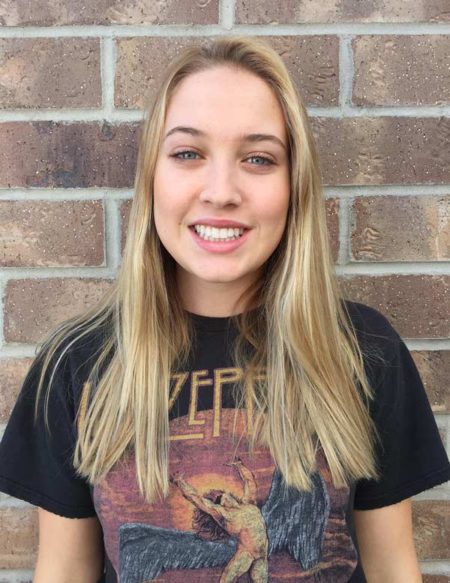
Recording Connection student Alysse LeFevre
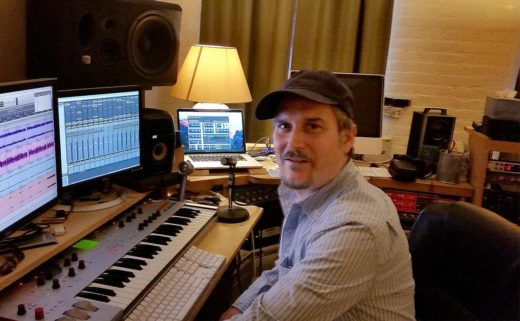
Recording Connection mentor Matt Stein
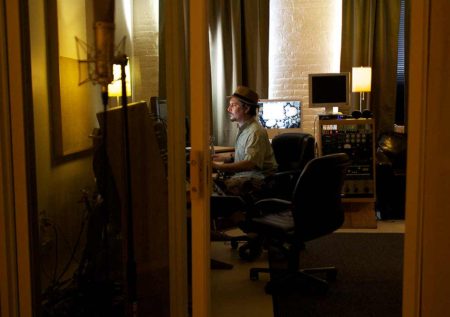 RRFC: Do you have a specific approach you take with artists? Let’s say I’m an artist coming to you and I want to do a project. What kind of questions are you asking? What do you want to know about me before you work with me?
Matt: I think a lot of it is influences, you know, because it’s so hard to communicate verbally something you’re looking for musically. And so always having examples of influences and things that they like and that they aspire to is always, I think, the best way of communicating what they’re looking for and, of course, you know, hearing their own music as well, what they’re doing. And I think as any good producer, I think it’s the job of the producer to not so much put their stamp on it or, you know, but really being about showcasing the artist, what they are.
RRFC: What do you think of the state of the music industry today, and is there anything you think really needs to change? Are there any cues we need to be taking from the more old-school approach, or things we just need to be doing differently?
Matt: Well, this is a good and a bad thing, it’s a double-edged sword: anybody can be a musician now, or anybody can have a band now, and there are so many bands. And so I feel like in some ways, [before] you had to have some sort of like ability to be in a band. Now I hear and see some bands that I feel like before, when I was in a band, they would’ve never gotten a show…so it’s good and bad. The other thing, I think, what’s killed the business is people decided at some point they don’t want to pay for music anymore. And the industry itself, on the industry side, they’ve definitely played into that with the streaming services that pay these fractions of fractions of pennies and stuff to artists for every play and stuff…not understanding that the people that put that music together put so much of their time and energy and spirit into developing that skill and ability, not to mention whatever it cost to record it and put it out.
RRFC: So what advice would you give to Recording Connection students just coming in? Let’s say someone wants to start the program next week. What advice would you give to them as to how they can make the most out of the experience?
Matt: As trite as it might sound to some, I say just practice. When I was starting out, even after I was already getting work and stuff, I would spend time just messing around, you know, learning, putting together libraries of sound that I liked to work with, just getting to know my gear, putting stuff through processes for the sake of putting it through a process or just so I could really get to know it inside and out. You know, it’s definitely not something that you read a manual on and then you can do it. I’m just constantly improving at it. As cliché as it sounds, it’s true. Every mix I do, I figure something out. And you’re always building on that, you’re just building on your experience. There’s no substitute for that.
RRFC: Do you have a specific approach you take with artists? Let’s say I’m an artist coming to you and I want to do a project. What kind of questions are you asking? What do you want to know about me before you work with me?
Matt: I think a lot of it is influences, you know, because it’s so hard to communicate verbally something you’re looking for musically. And so always having examples of influences and things that they like and that they aspire to is always, I think, the best way of communicating what they’re looking for and, of course, you know, hearing their own music as well, what they’re doing. And I think as any good producer, I think it’s the job of the producer to not so much put their stamp on it or, you know, but really being about showcasing the artist, what they are.
RRFC: What do you think of the state of the music industry today, and is there anything you think really needs to change? Are there any cues we need to be taking from the more old-school approach, or things we just need to be doing differently?
Matt: Well, this is a good and a bad thing, it’s a double-edged sword: anybody can be a musician now, or anybody can have a band now, and there are so many bands. And so I feel like in some ways, [before] you had to have some sort of like ability to be in a band. Now I hear and see some bands that I feel like before, when I was in a band, they would’ve never gotten a show…so it’s good and bad. The other thing, I think, what’s killed the business is people decided at some point they don’t want to pay for music anymore. And the industry itself, on the industry side, they’ve definitely played into that with the streaming services that pay these fractions of fractions of pennies and stuff to artists for every play and stuff…not understanding that the people that put that music together put so much of their time and energy and spirit into developing that skill and ability, not to mention whatever it cost to record it and put it out.
RRFC: So what advice would you give to Recording Connection students just coming in? Let’s say someone wants to start the program next week. What advice would you give to them as to how they can make the most out of the experience?
Matt: As trite as it might sound to some, I say just practice. When I was starting out, even after I was already getting work and stuff, I would spend time just messing around, you know, learning, putting together libraries of sound that I liked to work with, just getting to know my gear, putting stuff through processes for the sake of putting it through a process or just so I could really get to know it inside and out. You know, it’s definitely not something that you read a manual on and then you can do it. I’m just constantly improving at it. As cliché as it sounds, it’s true. Every mix I do, I figure something out. And you’re always building on that, you’re just building on your experience. There’s no substitute for that.
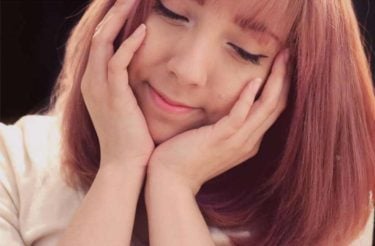 Film Connection student Jocelyne Berumen (Green Bay, WI) recently discovered her screenwriting mentor Tom McCurrie was hooked on her story! I was so surprised because most of what Tom had to say was praise to my writing. As I write this series, story information is kept from Tom as well. Every time he reads a new episode, he has no clue what is going to happen next. I have fun with it, but there are also troubles with it. Tom shows his excitement for my writing because he wants to know what is happening next, but as he edits, he is not sure where I am going with some things, because I haven’t revealed the complete story. Therefore, he points out some story issues that don’t make much sense yet. This is extremely helpful, because Tom is just like a viewer. The opinions and criticism he gives me help me dive deeper into solving the mystery of what real viewers will be thinking…In the beginning of this program, I didn’t know a lick of storytelling & scriptwriting. It wasn’t my biggest interest, so I didn’t pay attention to it at all. This course not only started by challenging me, it has begun to transform me.”
Film Connection student Jocelyne Berumen (Green Bay, WI) recently discovered her screenwriting mentor Tom McCurrie was hooked on her story! I was so surprised because most of what Tom had to say was praise to my writing. As I write this series, story information is kept from Tom as well. Every time he reads a new episode, he has no clue what is going to happen next. I have fun with it, but there are also troubles with it. Tom shows his excitement for my writing because he wants to know what is happening next, but as he edits, he is not sure where I am going with some things, because I haven’t revealed the complete story. Therefore, he points out some story issues that don’t make much sense yet. This is extremely helpful, because Tom is just like a viewer. The opinions and criticism he gives me help me dive deeper into solving the mystery of what real viewers will be thinking…In the beginning of this program, I didn’t know a lick of storytelling & scriptwriting. It wasn’t my biggest interest, so I didn’t pay attention to it at all. This course not only started by challenging me, it has begun to transform me.”
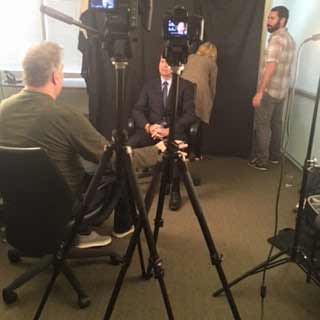 Jacob Richardson, Film Connection student at Joe Pollock Films (Minneapolis, MN) recently had the opportunity to assist his mentor on a noteworthy documentary shoot: “I joined Joe for a shoot for a documentary, being conducted by Joe’s customer, on cases where the suspects are believed to be wrongfully convicted. I gathered that the people interviewed teamed up with The Innocence Project, and the interviewers were attempting to bring light to cases where people have been perhaps wrongfully convicted and/or exonerated of their charges. While I was there, both a forensic pathologist and a lawyer were interviewed. I found both interviews incredibly interesting. During the shoot, my mentor instructed me on the types of angles we would be using, which were both a wide and a close-up. We also set up a tungsten light instead of using the florescent lights the room provided.”
Jacob Richardson, Film Connection student at Joe Pollock Films (Minneapolis, MN) recently had the opportunity to assist his mentor on a noteworthy documentary shoot: “I joined Joe for a shoot for a documentary, being conducted by Joe’s customer, on cases where the suspects are believed to be wrongfully convicted. I gathered that the people interviewed teamed up with The Innocence Project, and the interviewers were attempting to bring light to cases where people have been perhaps wrongfully convicted and/or exonerated of their charges. While I was there, both a forensic pathologist and a lawyer were interviewed. I found both interviews incredibly interesting. During the shoot, my mentor instructed me on the types of angles we would be using, which were both a wide and a close-up. We also set up a tungsten light instead of using the florescent lights the room provided.”

RRFC is education upgraded for the 21st century.
Get the latest career advice, insider production tips, and more!
Please fill out the following information, and RRFC Admissions will contact you to discuss our program offerings:
Stay in the Loop: Subscribe for RRFC news & updates!
© 2024 Recording Radio Film Connection & CASA Schools. All Rights Reserved.


